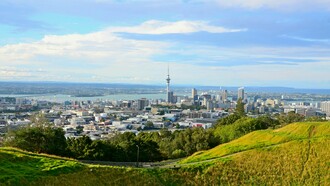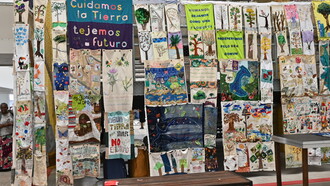The kingdom of Morocco, by virtue of its geographical location, remained open to diverse worlds and a meeting pot for a number of different cultures and religions, most notably the three heavenly religions of Judaism, Christianity and Islam.
These three religions have coexisted in Morocco for centuries since their meeting and presence on its territory, and across the various regimes that ruled it.
The Kingdom of Morocco remains a model of the state in which adherents of heavenly religions coexist, in unity and security, in fulfillment of its long history of religious and cultural diversity and pluralism that has distinguished the Moroccan entity for centuries. On this land, Muslims, Jews, and Christians have lived and coexisted for centuries.
The land of Morocco received thousands of people, Muslims and Jews, who fled religious persecution from the Iberian Peninsula, during the fifteenth and sixteenth centuries, and they were provided with generous protection in Morocco. The late King Mohammed V was the only head of state to give care and protection to adherents of the Jewish religion during the holocaust.
The cohesion that brings together Moroccans, regardless of their differences in beliefs, constitutes a shining model in this field. This cohesion is a daily reality in Morocco. This is evident in the mosques, churches, and malls, which continue to be adjacent to each other in the cities of the Kingdom. As the King of Morocco and Commander of the Faithful, he is ensuring the freedom to practice religious rituals. The king is the commander of all believers, regardless of their religions.
King Late Hassan II consolidated the values of coexistence
The efforts of the late Hassan II throughout the period of his accession to the throne of his blessed ancestors, to follow the same approach in caring for Moroccan citizens who adhere to the Jewish religion. The late sovereign remained keen on consolidating the values of coexistence and brotherhood among all Moroccans, Muslims, and Jews.
The bright idea of Morocco's tolerance and coexistence in Morocco was formed during the rule of Hassan II; may God have mercy on him. He was the one who presented Morocco as a golden link with its history, landmarks, men, and worlds. King Hassan II demonstrated this when he conducted a courageous and insightful dialogue with His Holiness Pope John Paul II on Wednesday, April 2, 1980, regarding the issue of Al-Quds.
The whole world followed that meeting, and the whole world reviewed the issue of al-Quds. It was a memorable day to see His Holiness the Pope addressing His Majesty the King, with these words:” You are the king of the country; no one denies its proud past. Your people, among the peoples of North Africa, are heirs to glorious and ancient traditions and bearers of a civilization whose radiance has marked and continues to mark the fields of culture, art and knowledge. In this context, you are the mouthpiece of the Islamic countries that have entrusted you with making known their feelings regarding the problem of Jerusalem.”
During the meeting, His Majesty the late Hassan II said: “I found in His Holiness the spiritual leader who understands the problems well and realizes that the time has come for the three heavenly religions, meaning that the children of Abraham, peace be upon him, whether they are Muslims, Christians, or Jews. He had highlighted that the three religious disciplines should meet in Jerusalem not for the sake of confrontation, but with the aim of establishing a common spiritual and historical heritage for the stability and safety of the world.
Thus, the relationship between the Vatican and Morocco was strengthened based on a solid foundation expressed by His Majesty the late Hassan II, who said: “The relations between Christians and Muslims have always been characterized in our country, since ancient times, by the spirit of fraternal understanding, and our ancestors made this spirit one of the foundations of their conduct.” There has never been a violation of this principle at any time, regardless of the practices of ancient times, and ever since Allah handed over to us the reins of rule, we have been very keen on our part to ensure that this principle is respected and carefully observed.
King Mohammed VI strengthened the bonds of human unity and coexistence
The papal visit to Morocco was renewed during the reign of the Commander of the Faithful, His Majesty King Mohammed VI. The Pope Francis made an official visit to Morocco on March 30 and 31, 2019, on an official visit centered on “interreligious dialogue and the immigrant issue at the invitation of His Majesty King Mohammed VI, which was an important event to strengthen interreligious dialogue and consolidate the values of peace and tolerance between religions.
Consequently, His Majesty King Mohammed VI followed the path of his distinguished predecessors in strengthening the bonds of human unity and coexistence between religions.
During the meeting with the pope, His Majesty King Mohammed VI delivered an official speech in four languages. In addition, he said that the choice of place and time for this visit was symbolic, saying: “We were keen that its time and place express the deep symbolism, the historical load, and the cultural stake of this event.
The historical site, which hosts our meeting today, combines the meanings of openness, transitivity, and cultural cross-fertilization, and, in itself, constitutes a symbol of balance and harmony. It was deliberately built at the confluence of the Bouregreg River and the Atlantic Ocean, and on one axis, extending from the Koutoubia Mosque in Marrakesh and the Giralda Mosque in Seville, to be a spiritual, architectural, and cultural link between Africa and Europe. We wanted your visit to Morocco to coincide with the month of Rajab, which witnessed one of the most symbolic episodes in the history of Islam and Christianity, when Muslims left Mecca, by order of the Prophet Muhammad, may Allah bless him and grant him peace, and took refuge from persecution to Negus, the Christian king of Abyssinia. This was the first reception and the first mutual acquaintance between the Islamic and Christian religions. And here we are today, together immortalizing this mutual recognition, for the sake of the future and future generations.
King Mohamed VI affirmed his adherence to the principles of coexistence and tolerance established by his predecessor. His majesty the king said in his speech, “The Kingdom of Morocco has been keen to speak out and always cling to the bonds of brotherhood that unite the children of Abraham, peace be upon him, as a basic pillar of Moroccan civilization, which is rich in the multiplicity and diversity of its components.















